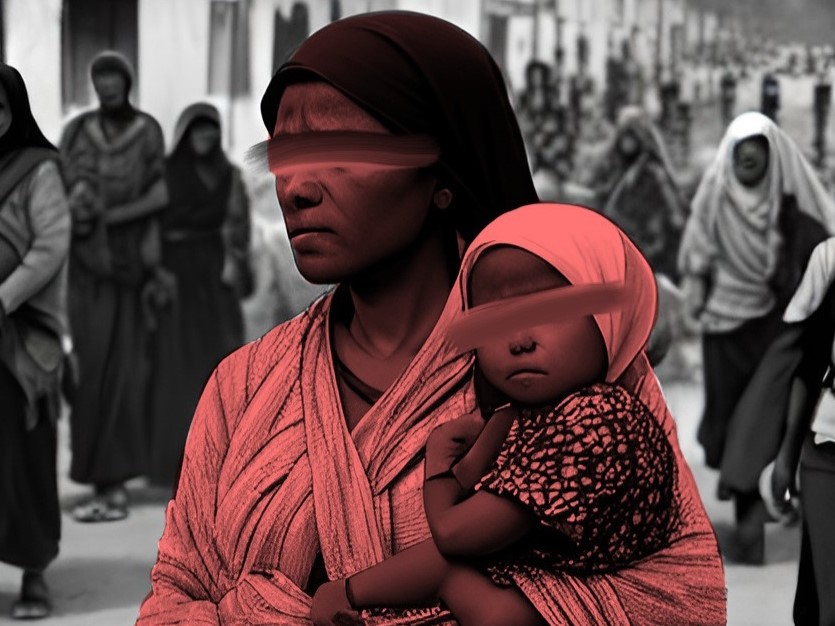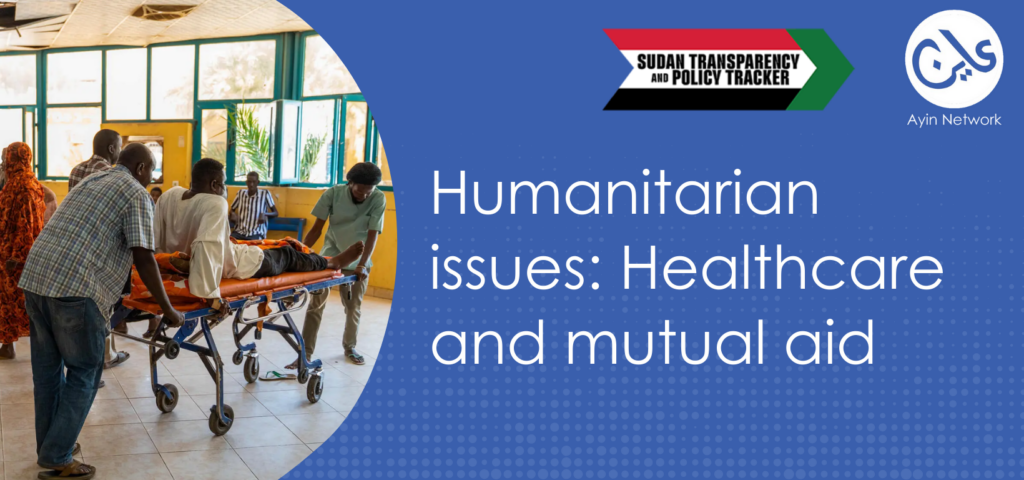Sudan Conflict Monitor #10
17 February 2023
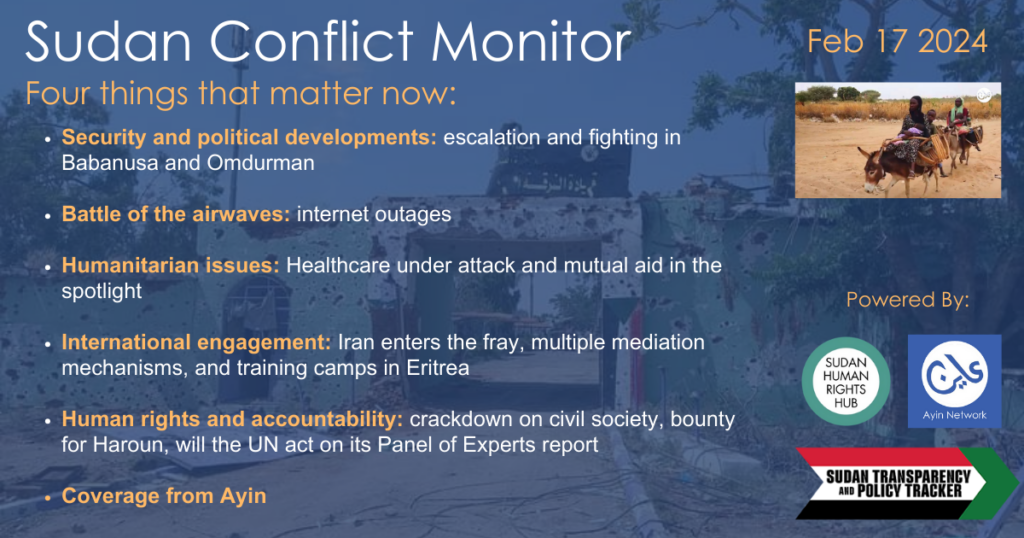
The Sudan Conflict Monitor is a rapid response to the expanding war in Sudan written through a peace-building, human rights, and justice lens. Here we have tried to capture the five most important stories in Sudan. Please share it widely.
Powered by Ayin Media and the Sudan Transparency and Policy Tracker
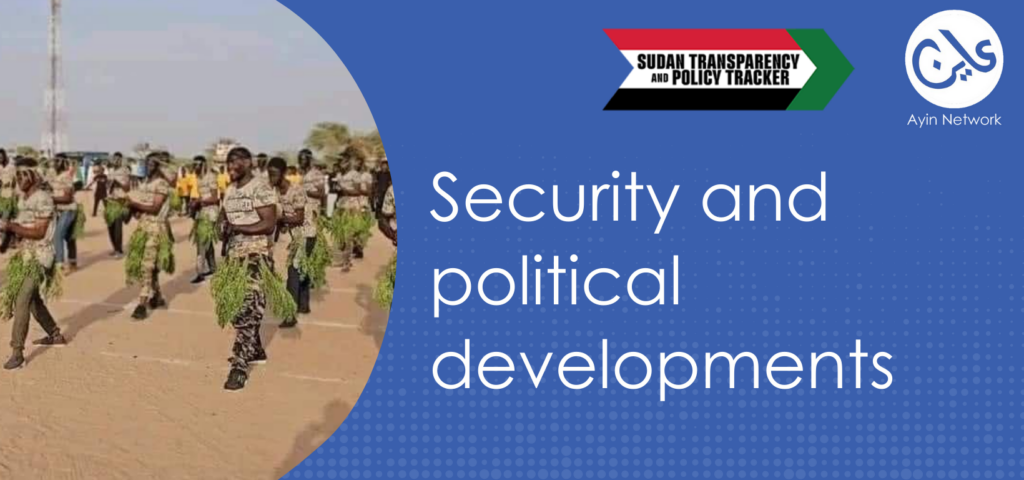
The parties signal escalation
After weeks of relative calm, the two generals commanding Sudan’s warring armies delivered escalatory speeches on February 11, vowing to fight to the finish. In an address to SAF’s fighters in the Northern state, Burhan sought to boost their morale, stating, “The Sudanese army has not been defeated and will not be defeated, God willing, and the state’s battle against the Daglao’s terrorist militia is a battle of dignity.” Burhan further rejected Rapid Support Forces (RSF) calls to the international community to deliver humanitarian assistance to areas under its control. “This will not happen until we end this war and defeat these criminal rebels and drive them from the homes of citizens, government and service institutions, and from all the cities they have plundered,” Burhan said in a speech to troops in Northern State. Lt.-Gen. Hemedti, in an audio speech, exhorted RSF’s soldiers to sustain the battle against the SAF, whom he blamed for opting for continued fighting instead of seeking a peaceful settlement. He claimed the SAF ignored his outreach for a peaceful conflict resolution and promised his fighters to join them on the frontlines.
It is noticeable that most of Hemedti’s address to his soldiers was to exhort them to protect civilians in areas they control and to root out the unruly behavior that characterizes their conduct towards civilians. As in previous speeches, Hemedti repeatedly attributed the widespread violations committed by the RSF fighters to “unruly elements.” This comes as a confirmation of the inability of the RSF senior command to maintain discipline in its ranks. Hemedti admitted in a side discussion with the leadership of the Coordination of Civil Forces to End the War and Restore Democracy (Taqaddum) that he had no power to control the hundreds of marauding RSF fighters who descended on Gezira state in December after the fall of Wad Medani. More ominously, he admitted that if he tried to do so, they might turn their guns on those he employed to stop them. This failure has come at a high political cost to the RSF, making its senior commanders the targets of international investigations for overseeing war crimes and crimes against humanity.
The battle for Babanusa
The stakes are high for both warring parties in the ongoing battle over Babanusa, a town situated in the southern region of West Kordofan State. Fortunately, civil actors were able to convince the army and RSF to allow civilians to leave the strategic town, the majority heading to other towns in the state, Al-Fula, and Al-Nahud, primarily. The SAF are trying to strengthen their presence in the town, fearing an RSF victory would effectively provide paramilitary control over the border, linking the western Sudan area to South Sudan and the passage of oil from Sudan’s southern neighbor. Local leaders also fear any escalation in the Babanusa conflict will devolve into a local conflict among the Misserya, the largest ethnic community in the region who maintain supporters of both warring parties.
SAF advances in Omdurman
There has also been significant fighting in Omdurman over the last month as the SAF attempts to regain ground after the devastating loss of Gezira State in December. The army reportedly made some gains, restricting RSF forces to a small corridor as they attempted to reach the central city. Al Burhan visited the city’s military command to boost morale. The army regained several neighborhoods and is now expected to imminently attack RSF units in the Sudan TV and Radio Omdurman building. More recently, the RSF has claimed victories in the Mohandiseen area, although the SAF has denied this. The Sudan War Monitor has reported that SAF is close to being able to break the siege on the Corps of Engineers area and that the attacks on Mohandiseen are an attempt to relieve pressure on that front.
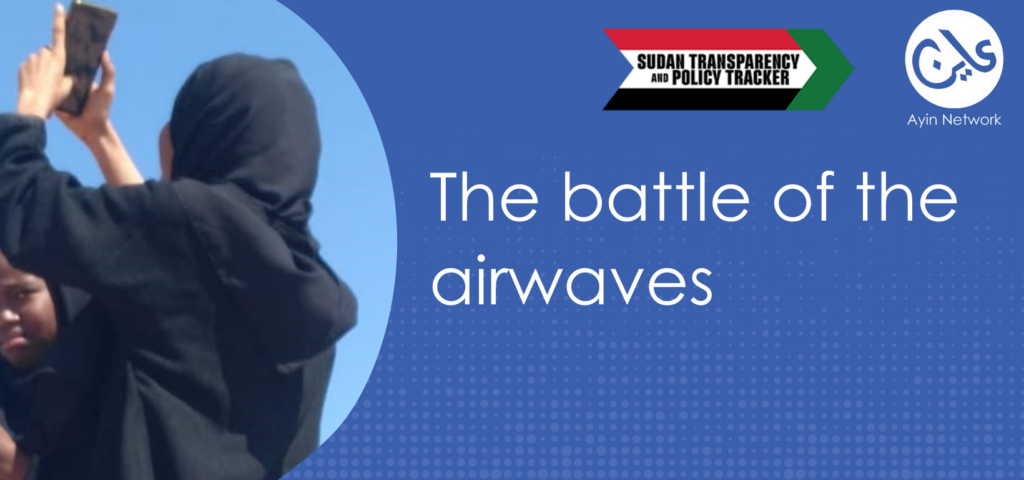
Media reports verified by STPT attributed the total telecommunications blackout that hit Sudan on February 7 to the lapse of the ultimatum that the RSF had given to Zain, Sudan’s largest cellular carrier and Internet provider, to restore services to Darfur by that date and cut it from SAF’s strongholds of the Red Sea and River Nile states, or risk the destruction of its servers, leading to a total communications blackout in the country. The coverage of Sudan’s two other carriers, Sudani and MTN, had already suffered severe disruptions starting on Friday, February 2, resulting from similar RSF orders and threats.
The RSF enforced the telecom blackout in retaliation against orders issued by the SAF-controlled government to all three companies shortly after the fall of Nyala to the RSF to cut their services from Darfur. The RSF reportedly learned only recently that the patchy to non-existent coverage in Darfur was not caused by damage to the physical infrastructure, as had been generally believed, but was ordered by the SAF.
This episode demonstrates Sudan’s vulnerability to the belligerents’ reckless tampering with vital services. During these few days of denial of service, the government in Port Sudan lost significant sources of revenue that remained accessible to it after the war, namely, the electronic collection of taxes, customs, and some fees on government services. Indeed, the government of Sudan raised such customs on imports and exports to increase resources available for its war machine. This included the issuance and renewal of passports in Port Sudan, which Sudanese embassies and consulates abroad have turned into a lucrative source of revenue for the government. Likewise, bank operations were seriously affected.
The tampering of the belligerents with Internet services risks denying millions of Sudanese stranded behind the front lines the critical lifeline of digital transfers through online applications, such as Bankak and Cashi, that allow migrants to transfer remittances to family members. Such applications also supported trade transactions that would have been nearly impossible in their absence. The absence of these applications has led to a severe decrease in cash liquidity, forcing the de-facto government to print more currency, inevitably increasing inflation.
Internet and cellular services were partially restored at this writing by one of the three main service providers. This episode demonstrates the vulnerability of the SAF-controlled government in Port Sudan to the denial of telecom services. The reason is that while the main international cables deliver the Internet to Sudan via Port Sudan, the main switches and servers of the government, the banks, and the main corporations, were set up in Khartoum in areas that came under RSF control after the war. Further, the RSF occupies the main building of the Sudan Telecommunications Authority. It is in a position to administer a chokehold on government services, including vital digitized revenue generation services, at any time, as the February incident showed.
More concerning, most government ministries, large corporations, universities, and other institutions have not managed to move their servers and backups out of the telecom building. Offsite backups are limited, according to telecom experts who took to social media to raise the alarm about the credible risk of obliteration of Sudan’s digital memory. The two parties critically need access to telecom services. This should test their ability to reach pragmatic agreements to keep these vital services operating to protect them from further destruction and instrumentalization in their fight.
Meanwhile, entrepreneurs in Darfur and elsewhere have already found alternatives to the Khartoum-based telecom companies for providing Internet access to local populations and the war-displaced at reasonable prices. The weekly Atar investigative magazine published in its February 1 issue an interesting article on the expanding network of Internet cafes using SpaceX’s Star Link technology in Darfur. However, colleagues in Darfur report that sourcing such units is difficult, limiting the ability to scale up such services. In addition, it can also be used for military purposes.
Healthcare under attack
An estimated 80% of hospitals in Sudan are out of service, leaving those in need of care in a desperate situation. More than 30 healthcare workers have been killed and 60 facilities have been attacked (including being subjected to looting and attacks on healthcare workers). 54 incidents of looting were reported. Warring parties have deliberately blocked medical access. For example, in one reported case, a civilian was barred from accessing a hospital in Khartoum by RSF soldiers insisting that the hospital was their facility. RSF banned movements of surgical supplies in the capital. A report by the Al Geneina resistance committee claims that 237 patients died as a result of RSF attacks on medical facilities there, including dialysis patients and women in need of obstetric care.
Recently, staff at Bashayer Hospital reported that they were unable to provide care after their hospital was attacked. This deterioration of medical care has led to outbreaks of epidemic diseases such as cholera. The Sudanese Minister of Health reported that there had been 10,000 cases and 284 deaths through the end of January.
In addition, levels of hunger are increasing in Sudan, and these are usually connected with an increase in related diseases. An estimated 18 million Sudanese are reported to be hungry today, just after the harvest, when food stocks should be at their highest in the year. According to Fikra, only 37% of the land cultivated in prior years is being cultivated this year. Further, the recent RSF takeover of Gezira is causing new disruptions estimated to reduce local wheat cultivation by 70 percent. Clingandael warns that without urgent assistance, this will become the largest hunger crisis in decades and increase displacement.
Sudan mutual aid in the spotlight
Sudan’s humanitarian situation is bleak, but one of the recommendations of the Clingandael report is to direct emergency aid to first responders, such as the Emergency Response Rooms (ERRs). Young people in communities across Sudan started these community-based responses to respond to urgent needs, neighborhood by neighborhood. There are now estimated to be 117 such ERRs nationwide and hundreds of other mutual aid efforts.
In early February, a delegation of young frontline humanitarian workers traveled to New York and Washington DC for Sudan Solidarity Week to share stories of their impact and advocate for more localized aid to support communities. The delegation, from Darfur, Khartoum, and SPLM/A-North controlled areas, represented the diversity of mutual aid efforts that have emerged in the face of the international community’s failure to respond. In the Nuba mountains, community mutual aid groups are hosting nearly 400,000 IDPs, while in Darfur ERRs are helping to support hospitals; in Khartoum, ERRs run soup kitchens across the city.
In New York, the delegation met with UN Humanitarian Affairs chief, Martin Griffiths, and other UN officials. Among other points, the delegation requested that local aid workers be counted in UN statistics about attacks on aid workers and that the UN invest more in localised aid, especially in areas they cannot access.
In Washington DC, the delegation met with USAID and US government officials to raise awareness about the impact of the war, looming famine, the need for flexible funding, and severe restrictions on humanitarian access. USAID Administrator Samantha Power gave a forceful speech in support, acknowledging that USAID had to make changes to meet the challenge of Sudan.
Power called the delegation “forces of light that are putting so much on the line on behalf of their brothers and sisters on the ground” working in “some of the worst conditions for humanitarian access in the world today,” organizing evacuations, arranging burials, offering food and medicine. Shortly after the visit, a Senate resolution was put forward mandating US support to local community-based organizations that are currently providing humanitarian assistance – and calling for the protection of civilians – but even if passed, this will not be binding on US policy, but rather just an expression of collective Senate sentiment.
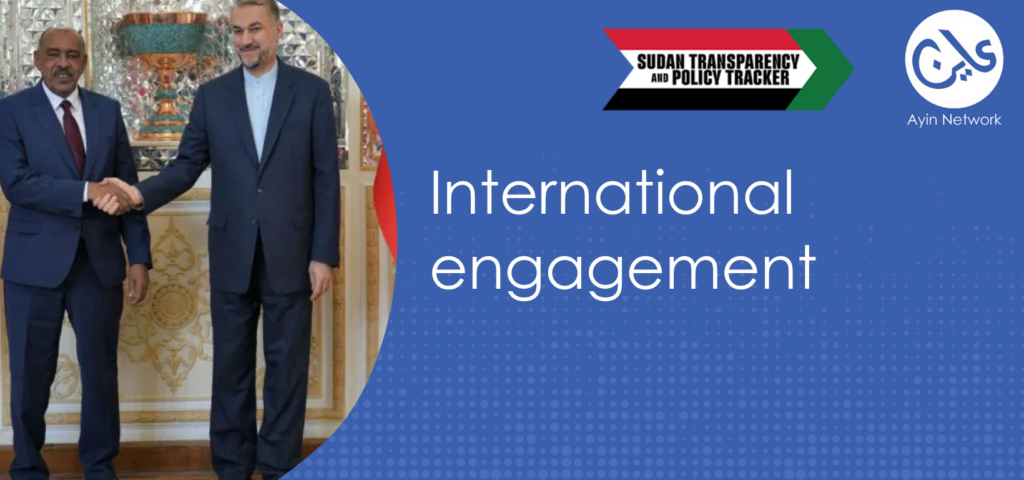
Iran enters the fray
It seems like Iran is getting more engaged in the war in Sudan. Sudan War Monitor and others reported on several Iranian shipments to Sudan, suspected to be drones. The RSF has reported that it shot down several Iranian Mohajer-6 armed drones and posted a video of its fighters recovering debris from the Nile and another from a rooftop. Advanced drones could improve the SAF’s operational capacity, especially in Omdurman, where fighting is ongoing.
The reported military support is linked to a revival of diplomatic ties. On February 5th, a Sudanese delegation led by the Foreign Minister visited Iran and met with his Iranian counterpart and president. This was the first official visit since Sudan abruptly severed bilateral ties in 2016 under pressure from Saudi Arabia. The talks included the resumption of full bilateral relations, including the re-opening of embassies.
The fast-paced diplomatic rapprochement between Sudan and Iran comes at a time of rising tensions in the Red Sea and the Horn of Africa, as the Iranian-backed Yemeni Houthi militia threatened international navigation routes on the vital waterway in response to the war in Gaza. The prospect of the revival of the partnership between Iran and the hardline Islamist stalwarts of the Bashir era, who are believed to be fueling the ongoing conflict in Sudan in a bid to return to power, raised alarm among regional and international intelligence agencies. At the same time, it may also influence US policy as the Iran connection is likely to give defense and security actors greater influence within US government discussions on the issue.
More platforms, more confusion in the mediation process
The latest IGAD engagement
On January 18, 2024, the Intergovernmental Authority on Development (IGAD) held a meeting for Heads of State and Government to discuss the ongoing situation in Sudan. The communique “emphasized that Sudan does not belong to the parties to the conflict, but rather to the Sudanese people and reiterated their call for an immediate and unconditional ceasefire and cessation of hostilities to pave the way for a political dialogue,” a strong reflection of the need for civilian leadership in negotiating Sudan’s future. This was further underscored by a reference to the primary responsibility of IGAD Member States to ensure that the will of the people prevails. Welcoming the communique, Africans for the Horn of Africa called on the IGAD Member States to make “stronger and more decisive efforts” to bring the parties to the table and to center the protection of civilians.
Although these are positive elements, the credibility of the initiative was undermined by its failure to maintain engagement with both of the parties. The Sudanese Foreign Ministry, affiliated with the army, refused to attend when they learned the RSF leader was invited. Indeed, the Foreign Ministry issued a statement shortly thereafter withdrawing from IGAD over what it characterized as assaults on its sovereignty. This has created even more confusion in Sudan’s complicated mediation.
Bahrain: The Manama Talks
In the wake of IGAD’s inability to bring the parties together, shared anxiety about Iran’s retrieval of the foothold it had in the 1990s Sudan must have contributed to the convening in Bahrain of three meetings in January between the SAF’s third in-command General Shamseldin Kabbashi, and the RSF’s operational commander General Abdelrahim Dagalo, a brother of Lt.-Gen. Hemedti. The conveners included the backers of the warring parties, Egypt and the United Arab Emirates, the facilitators of the struggling Jeddah ceasefire talks, the US and Saudi Arabia, and the representatives of Bahrain. While no statement came out of the talks, reports indicated that the two commanders agreed on basic principles such as the primacy of the unity of Sudan and its national army. Prospects remain open for further meetings in Manama designed to lead to the resumption of the ceasefire talks in Jeddah. The talks might have convinced SAF and the RSF to restrain themselves from launching new major military offensives. The shift in policy could have triggered dissent and is rumored to be the source of conflict over operational strategy within the SAF’s senior command, leading to the arrest of four senior commanders in the Wadi Sayedna airbase serving as the alternate SAF HQ.
In addition, the two parties reportedly agreed to discuss the facilitation of humanitarian access under the UN auspices in Switzerland, but have yet to set details about when and where.
However, the decision of the SAF-controlled government on the 10th to commit only to the Jeddah talks signaled that the powers that are behind the SAF have disavowed both the proposed Switzerland and Manama talks. Indeed, Kabbashi came under heavy attack on the Islamist social media platforms for engaging the SAF in talks with the RSF.
A leaked account of the Manama talks published in Al Tagheer online newspaper claims that the first two meetings between the SAF and RSF reached agreements to de-escalate hostilities and laid out the foundations for broad agreements of solutions for the crises, starting with the resumption of the Jeddah ceasefire talks. Quoting an unnamed military source, the newspaper suggested that Kabbashi did not show up for the third meeting, leaving the Manama process in limbo. This account offers a plausible explanation of the sudden escalation in hostilities in the second week of February that affected the tripartite capital, El-Fasher, and South Kordofan.
This also appeared to emphatically retract the previous agreement by Burhan to attend the UN humanitarian talks. The RSF affirmed its commitment to the meeting to gain favor with the international community as part of its campaign to appear as a responsible peace and humanitarian partner.
Training camps in Eritrea
Reports about the opening in Eritrea of five training camps for armed movements from eastern Sudan and a sixth for the Minni Minawi faction of the Darfuri Sudan Liberation Movement (SLM-Minnawi) raised concerns about the growing external engagement in Sudan’s war. By opening its territory to train Sudanese fighters, Eritrea is pursuing its security interests and its regional power calculations. The much-feared extension of the war to eastern Sudan following the fall of Gezira state to the RSF in December 2023 prompted a call to arms by the SAF and the armed groups that sought training in Eritrea. The latter is likely to intervene directly on the side of the SAF to prevent the region with long borders from falling to the RSF.
Weighing on the decision of President Isaias Afwerki to involve his country in the war in Sudan are concerns about the presence in eastern Sudan of tens of thousands of Eritrean refugees and a coalition of Eritrean opposition groups. The latter could benefit from the chaos of an RSF incursion to launch cross-border attacks to topple the regime. Afwerki is also seeking to counter the growing influence of the UAE in the Horn of Africa generally and with the RSF specifically with its military assistance to the RSF. An RSF takeover of eastern Sudan would also favor Ethiopia, which is concerned about SAF’s historical ties with the Egyptian army and establishment and has developed close ties with the RSF commander Hemedti.
The position of the SAF and the government it controls in Port Sudan regarding the growing number of armed movements training in Eritrea appears mixed. Several groups predated the war and re-emerged to support the SAF’s military efforts to stop the expansion of the RSF’s zone of control to the East. The groups also say they want to defend their communities against the atrocities associated with the RSF. At the same time, the groups’ autonomy represents a concern for the SAF.
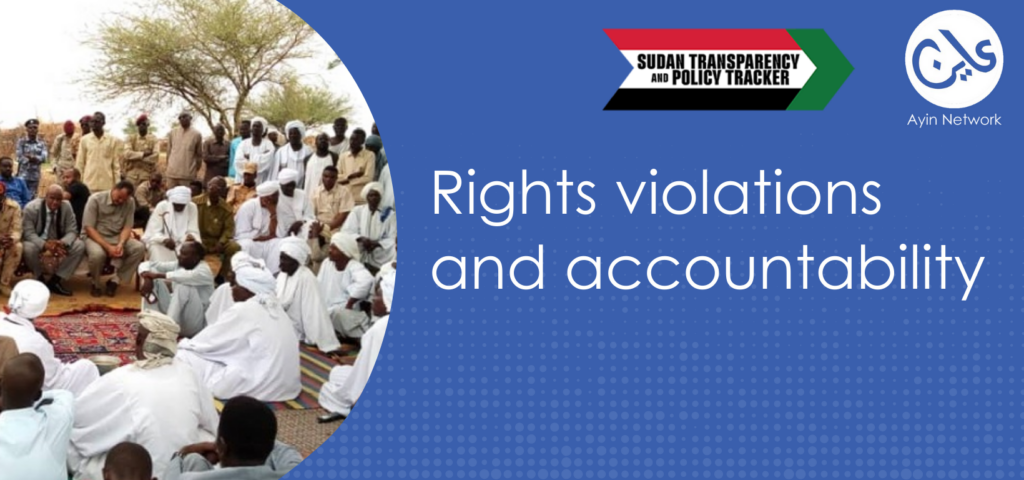
Crackdown on civil society
In the wake of RSF advances in eastern Sudan, the Sudanese population had to deal not only with serious violations by the RSF but also a SAF crackdown on activists, as described in the last monitor. This crackdown has continued in the last month.
On January 16, Federal Governance Minister Mohamed Saleh issued a decree dissolving all services and change committees in all the states. This was built on prior similar moves by the state authorities of River Nile, Northern State, Gedaref, and others. The government has accused these committees of collaborating with the RSF, an accusation which they strongly deny. Indeed, although the decree claims that it will allow alternative structures to coordinate aid, it runs the risk of seriously disrupting the work of frontline humanitarians working in Emergency Response Rooms and other mutual aid arrangements.
An activist in Gedaref reported that he was the victim of an abduction attempt in mid-January. In Kadugli, activists reported that 40 youths were arrested including resistance committee members.
Bounty for Haroun is the latest in US sanctions strategy
On January 29, 2024, the same day the prosecutor for the International Criminal Court (ICC) addressed the UN Security Council, the United States announced a reward of $5 million for information on Ahmed Haroun, who is wanted by the ICC for crimes and crimes against humanity in Darfur between 2003 and 2005. Haroun is the first Sudanese suspect to be designated by the Department’s “war crime rewards program,” a 20-year-old program that aims to create incentives for suspects of serious crimes – such as war crimes, crimes against humanity, and genocide – to be turned in or turn themselves in.
The news of Haroun’s designation under the program elicited a round of jokes about bounty hunters cashing in, but it also raised questions. Why list Haroun and not Omar al-Bashir or Abdel Raheem Hussein, who are also wanted by the ICC? One may surmise that a bounty on either of those two would be meaningless if they are in al-Burhan’s custody as many believe, though one might say the same about Haroun, even if he is at large in eastern Sudan. Even assuming the reward could be an incentive, why announce it now after so many years? The arrest warrant for Haroun was issued in 2007 and Western pressure should have come sooner; Ali Muhammad Ali Abd-al-Rahman (“Ali Kosheib”) turned himself in in June 2020.
There might be another strand to the logic. The US is looking for any chance to call out active Islamists from Bashir’s regime. Haroun, who was arrested and imprisoned with Bashir and about two dozen regime cronies, is a known Islamist and headed the ruling National Congress Party briefly before al-Bashir was ousted from power. He told the media in late April that they had all escaped prison. In July, he was seen mobilizing troops in Gedaref. Meanwhile, SAF-aligned prosecutors told the media they dismissed various charges against him and other “hardliners” that transitional authorities had brought. Haroun’s designation is the latest in a string of sanctions since the war started.
Since it imposed a sanctions regime in May 2023, the US has announced periodic sanctions against individuals and entities. It sanctioned Bashir-era Islamists such as Ali Karti and Salah Gosh, some lower officials, and RSF commanders, including Abderahim Dagalo, Hemedti’s deputy. The US Treasury has also sanctioned SAF and RSF-affiliated companies and banks. However, these rounds of sanctions have not visibly influenced the warring sides, both of which continued to fight and to receive external support and material. A better strategy is needed, argue analysts, particularly given the failed ceasefire negotiations and competing mediation efforts.
In early February news surfaced that the US will finally appoint a new special envoy for Sudan, Congressman Tom Perriello. This is a welcome move, one that advocacy groups have pushed for months, and should coincide with a policy shift that makes Sudan a much higher priority, as Cameron Hudson, former Chief of Staff for the U.S. Special Envoy to Sudan, argued in a recent briefing.
Will the UN act on new evidence from its Panel of Experts?
The latest report of the UN’s Panel of Experts for Darfur, widely circulated in recent weeks, but not yet officially published, is a welcome addition to the mounting documentation of violations of international humanitarian law and the impacts of the war on civilians in Darfur since the war started in April 2023.
The report details RSF and allied militia attacks on mostly Masalit civilians in West Darfur. It charts the ethnically motivated attacks in El Geneina and Ardamata, targeting of displaced people and prominent community members, indiscriminate fire by snipers, attacks on hospitals and clinics, and sexual violence, among other serious crimes. The panel estimates between 10,000 and 15,000 people were killed in and around El Geneina – more than the number of reported deaths across Sudan as a whole since the start of the war. Significantly, the panel goes into detail on how the Arab militia, native administration leaders, and the RSF collaborated in arming Arab fighters and carrying out the widespread attacks. The report provided analysis of “extensive ethnic-base recruitments in Darfur” by both warring parties both before and during the current armed conflict –inevitably sparking violence amongst communities.
The report also names several individuals involved in attacks, including the RSF commander in charge of West Darfur, Abderahman Jumaa Barakatallah – enough evidence for the UN Security Council to act on, urged Human Rights Watch. It also describes financial networks including some 50 companies associated with RSF and details supply lines for weapons in violation of the existing UN arms embargo on Darfur. This evidence could be used as the basis for further sanctions or the extension of the current arms embargo to the whole country and/or action against those who are violating it. With this report, the UN Security Council certainly has the evidence needed to take further actions – will it?

Follow Ayin: YouTube Facebook Twitter
Ayin Coverage (Arabic)
What’s behind the escalation of the war in West Kordofan? – Feb 12 – The report analyzes the dynamics between the warring parties, which includes tribal dynamics as well as the issue of control of the oil pipelines and border trade with South Sudan.
Eyewitness accounts of RSF detainees – Feb 8 – Survivors tell of extra-judicial killings and mutilations in RSF prisons in West Darfur after the RSF and its allied militias attacked El Geneina and the surrounding towns.
SAF new recruits oppress civilians – Feb 7 – With the escalation of the war, Ayin examines how recently recruited civilians have implemented martial law in SAF-controlled areas by harassing, and in some cases killing, civilians.
The most violent war on the bodies of Sudanese women – Feb 1 – Accounts by survivors and witnesses indicate serious violations against women in conflict areas, centering around rape, sexual violence, and kidnapping. Ayin has collected testimonies in many areas that witnessed the heaviest battles, including the Sudanese capital and the Darfur region. –
What happened in Tendelti, West Darfur?– Jan 8 – On December 31, RSF and allied militias attacked the Tindelti area in West Darfur state, forcing hundreds to flee to Adre, eastern Chad. Eyewitnesses tell of brutal violence and killing of their family members that occurred in Tendelti.
Darfur armed movements and RSF clash in Milleet – Jan 31 – In the last week of January, the joint forces of the Darfur armed movements clashed with the RSF in the town of Milleet, 70km north of El Fasher, North Darfur State. The clashes killed 8 people and hindered market and humanitarian movement.
Will arming civilians lead to civil war in Sudan? – Jan 25 – Ayin sat down with civil actors of different opinions, as well as from different parts of Sudan, to explore views on arming civilians in self-defense.
Ayin Coverage (English)
- Sudan’s war on women, February 2024
- Authorities raise duties to fuel the war, prices rise again for the public, February 2024
- West Kordofan: The battle for Babanusa, January 2024

Sign up for the Sudan Transparency and Policy Tracker newsletter here
- Competition Among Sudan’s Mediators: The Prospects for Peace Hang in the Balance February 2024
- An Open Letter to Dr. Abdalla Hamdok February 2024
- Sudan Conflict Monitor #9 January 2024


